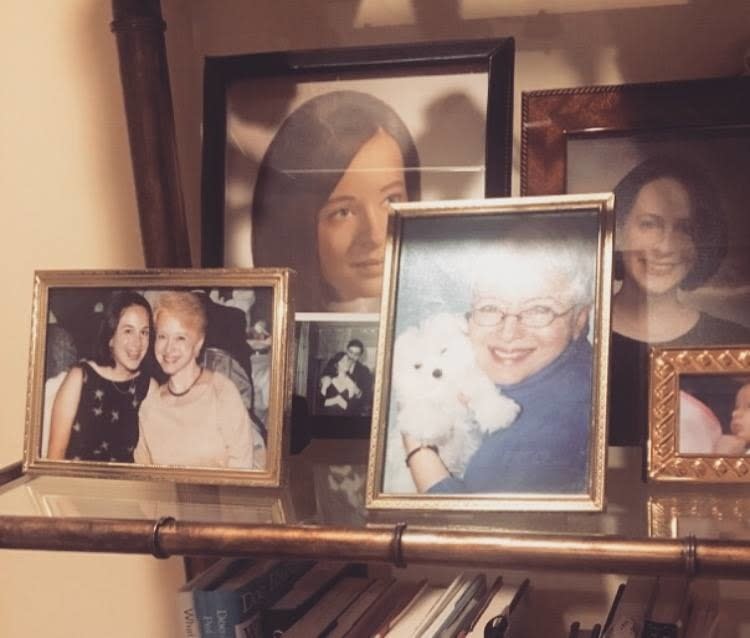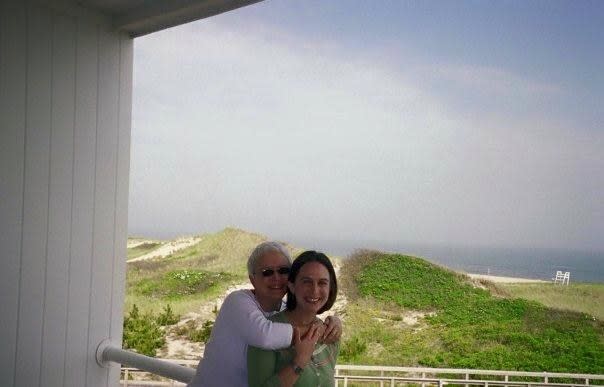My Mom's Breast Cancer Story Doesn't Have a Happy Ending
My mother, Joan, never thought anything was impossible. She went from high-school teacher to stay-at-home mother to starting law school at 50 and joining a practice. When I took piano lessons, she did, too — and showed me up. My parents were so happily married that it was kind of annoying, though I love to think of it now: If they heard a song they both loved, they would get up from the dinner table and dance.
I was a junior in college when my mother was diagnosed with breast cancer. She was 51 and felt a lump in her breast while showering. She had just had a clean mammogram a few months before, but it nagged at her enough that she got it checked out. It turned out to be stage 1 breast cancer.
She elected to have a mastectomy. My parents chose not to tell me what was going on until the night before the surgery. I got the news just as I had come back from a study-abroad prep meeting for London; the biggest stress of my day had been finding an adaptable plug for my hair dryer. One second, life was normal, and the next, it wasn't. I decided not to study abroad that following semester.
Being in a foreign country while there was something so foreign in our lives didn't feel right to me. I wanted to know every detail of how my mom was feeling at every hour — not knowing what was going on was more terrifying than hearing what was. My worst fears about what could happen seemed more real without information, and I needed to know I could be home in under two hours if something happened.
My mom never got the five-year remission every cancer survivor waits for. It took only two years for the cancer to metastasize to her liver, and it was at that point that we knew her case wasn't curable. After the first recurrence, my parents had to acknowledge that she wasn't going to be one of the happy ones celebrating kicking cancer's ass at cancer walks and being the inspiration for others to draw on. My brother and I overheard my parents crying one night when they realized they weren't going to grow old together.

My Mom's Breast Cancer Story Doesn't Have a Happy Ending
Courtesy of authorShe battled recurrences for nearly a decade. There was always another chemo drug, another tumor marker test, another PET scan. We lived from test to test. When Mom was on chemo, we held our breath for her white blood cell counts, as the chemo made her immunodeficient. When it got too low, she had to be hospitalized. There were full-body PET scans to see if the cancer had popped up somewhere else. Her hair fell out, and she was nauseous, and she had "chemo brain" forgetfulness. There were the highs of good test results and the lows of the bad ones.
There were calm periods, too, as life went on and my mom made sure that the cancer didn't prevent her from doing things she loved. She always said she focused on how to live, not how to die. She and my dad went on their first trip to Europe fo,r their anniversary, two years after her mastectomy. After her first recurrence she took a trip to Israel, something she had always wanted to do.
But nothing changed the fact that cancer was an unwelcome new member of our family. It was the black sheep — we always had to acknowledge it, to placate it. It was the most high-maintenance one among us. It sucked — there's no other way to put it, and it's a word my mom used frequently.
Over the course of my mother's cancer, knowledge was my form of control. I'm now a research editor, so I suppose it makes sense. Learning the specifics of her treatment, what side effects to expect from a particular chemotherapy, the details of her metastases, the results of the tumor marker tests — all these things let me feel like an active part of the process, instead of passively reacting to the situation. In some ways, I think my mom's cancer was most complicated for my father, Howard, a diagnostic radiologist. He was always too aware of what was happening.

My Mom's Breast Cancer Story Doesn't Have a Happy Ending
Courtesy of authorMy mother died nine years after her diagnosis. Her death was nothing like you see in the movies. We didn't have time to get her into a hospice, as she died less than a week after she was admitted to the hospital, in a dark, depressing room. She checked in after feeling pain, weakness, and lethargy; scans showed she had liver failure from the latest experimental treatment and from the cancer itself. I'd wait for the brief moments when she was semi-alert and tell her as clearly as I could how much she meant to me. I'd also pepper her with questions as if she were a Magic 8 Ball: "Will I find someone who will put up with me?" "Are you worried about my future?" It's like I thought she had some fortune-teller ability on her deathbed. I wish I could take some of that back.
After she died, it was a strange transition. When she was in treatment, I was always waiting for the other shoe to drop. Then I stopped living from test to test. It's different when you're not carrying the weight of uncertainty around — it's sad not to have hope, the possibility of a positive test result. Now there was no more good news. All I could think was how do I live without my mom? She was my best friend, the person I'd call multiple times a day, saying "I love you" each time we hung up. How does life go on? It was unthinkable in the days, weeks, and even months after she died. And even nine years later, it still hits me sometimes like a fresh loss, like it's happening all over again.
In the years since my mom died, I've watched friends and colleagues go through similar experiences with their own parents. I know every illness is different, but I tell them what my cousin told me: Accepting the things I can't control is a form of control in itself. I couldn't influence the outcome of my mom's breast cancer prognosis, but I could control how I reacted, and I could be there for her. I could know if my mom's hands were cracking and burning as a side effect from a particular chemo and seek out the cream that could help soothe them. I could send her funny cards and books, and just say I love you. All the time. It's not an easy thing to do, but it was the thing I could do.
Read more about breast cancer on Allure:
9 Natural Beauty Brands That Donate to Breast Cancer Awareness in a Major Way
Julia Louis-Dreyfus Just Shared Her Breast Cancer Diagnosis Along With a Powerful Message
Serena Williams Goes Topless to Sing "I Touch Myself" for Breast Cancer Awareness
This cancer survivor dispels the myth that breasts equal femininity:

